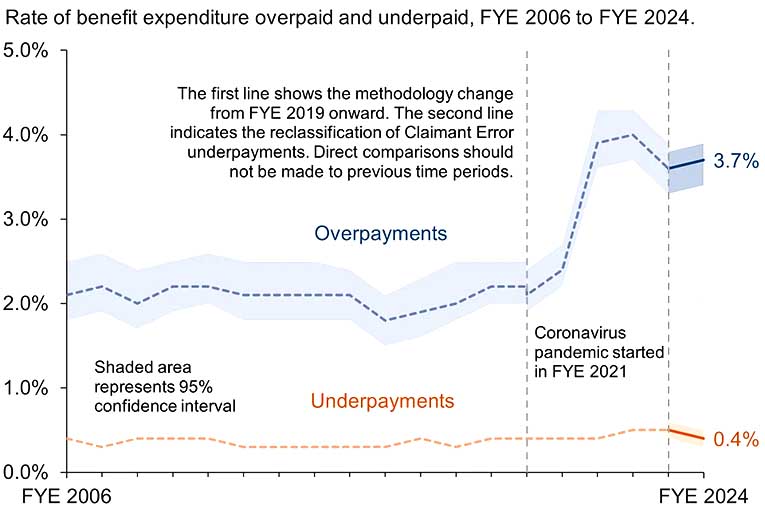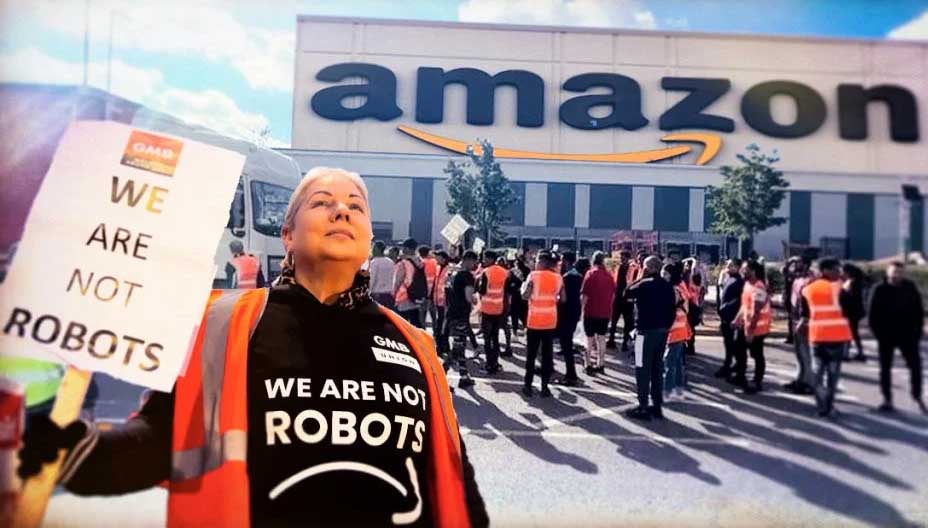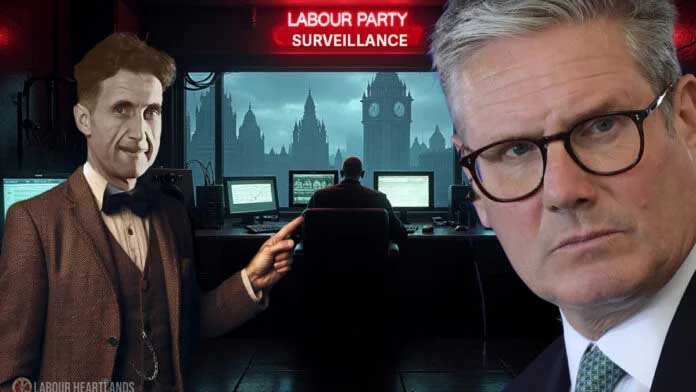The government can’t say who’s committing fraud or how much it really costs – if they could, they’d be catching the actual fraudsters instead of building a surveillance system to monitor everyone’s bank accounts. They’re using a mathematical model based on a tiny sample to justify treating every claimant as a potential criminal. It’s like assuming everyone in Manchester is a football player because you saw a match at Old Trafford. This isn’t evidence-based policy; it’s policy-based evidence …
In a below-the-line exchange with Dave Hansell – apropos my last post but one, What is to be done? – we noted high demand for food banks in the city we both inhabit. I lamented the fact my focus on empire’s crimes in distant lands has come at the expense of attention to “human suffering in the imperial hub itself”.
Within hours Dave sent me a link to a piece by Paul Knaggs on his UK site, Labour Heartlands. In his words, Paul is: “fighting a constant struggle with dyslexia that’s overcome with a burning desire to speak out against the corrupt political system and the social injustices it creates.”
Not that I’d have guessed the dyslexia part, possibly because it is eclipsed by a “burning desire” to slay dragons – of which, you’ve likely noticed, there’s no burning shortage. This splendidly written epistemological sermon subjects howler after methodological howler – each a master class in that peculiar fusion of arrogance, economic illiteracy and indifference to despair sold, pace Mrs Thatcher, as TINA which has led the Starmer-Reeves Act to unprecedented levels of unpopularity at unprecedented speed – to the cold light of rational scrutiny.
Without further ado, here’s Mr Knaggs with a sorry tale of heartless parsimony, state snooping – and car key confiscation.
Welcome to Starmer’s Britain: Where Your Bank Account is Public Property and Your Car Keys Belong to the State
In a move that would make George Orwell’s ‘Ministry of Love‘ blush, Labour has unveiled its latest weapon against the poor: the power to confiscate driving licenses from benefit claimants who can’t repay alleged overpayments. Let’s pause to appreciate the twisted logic here – people with “no job, no income, and no savings” will somehow be motivated to repay money they don’t have by losing their ability to drive to potential job interviews or even jobs if they were lucky enough to get one.
The sheer cynicism of this policy becomes apparent when we examine the numbers. While trumpeting £7 billion in benefit fraud, the government conveniently mumbles about the £1.6 billion overpaid due to claimant errors and £0.8 billion due to DWP’s own mistakes.
This is the same DWP that recently forced 134,000 carers into debt by demanding repayment of their Carer’s Allowance – not due to fraud, but because of a Byzantine system that punishes people for earning a penny over £151 per week.
Consider the Kafkaesque nightmare Labour is creating: a carer who picks up an extra shift to make ends meet, or receives a modest Christmas bonus, can see their entire £81.90 weekly Carer’s Allowance vanish overnight. This triggers the DWP’s notorious investigation machinery – a system so prone to errors that thousands of innocent carers have faced wrongful accusations of benefit fraud. 1
The consequences cascade: demands for repayment of supposedly “overpaid” benefits can lead to automatic deductions, pushing families into crisis. And yes, with this new bill, while fighting these battles with the DWP, claimants can face the additional threat of losing their driving licenses through a system that presumes guilt before innocence.
This isn’t dystopian fiction – it’s the reality of Britain’s benefits system, where administrative errors routinely become personal catastrophes for those least able to fight back.
Yet while the DWP zealously pursues the poorest over pennies, often based on their own mistakes, the government’s own figures show tax evasion costing us £5 billion annually. Curiously, we see no similar enthusiasm for pursuing tax-dodging business owners or seizing their Range Rovers. The message is clear: ruthless enforcement for the poor, kid gloves for the wealthy.
Inflating Numbers, Deflating Rights: Statistical Smoke and Mirrors
Here’s the shocking truth behind Labour’s crusade against benefit “fraudsters”: their £7 billion figure is built on statistical quicksand. The government’s entire case for this draconian surveillance state rests on examining just 13,300 cases – a mere 0.06% of all benefit claims. That’s right: they’re writing policy to punish millions based on looking at about one claim in every 1,700.

Even more telling is how they inflate the numbers. When Universal Credit overpayments increased from £5.5 billion to £6.5 billion last year, it wasn’t because fraud increased – in fact, the error rate actually dropped from 12.7% to 12.4%. The number went up simply because more people needed Universal Credit. This is statistical sleight of hand at its finest: using bigger numbers to justify bigger punishments, while hoping nobody reads the small print.
The government can’t tell us who’s committing fraud or how much it really costs – if they could, they’d be catching the actual fraudsters instead of building a surveillance system to monitor everyone’s bank accounts.
They’re using a mathematical model based on a tiny sample size to justify treating every benefit claimant as a potential criminal. It’s like assuming everyone in Manchester is a football player because you watched one match at Old Trafford.
This isn’t evidence-based policy; it’s policy-based evidence, where the conclusion came before the research. And now Labour wants to use these questionable statistics to justify one of the biggest expansions of state surveillance in recent British history.
Let’s call this what it really is: financial fear-mongering designed to manufacture consent for state surveillance. By brandishing billions in alleged fraud losses – numbers inflated by their own statistical gymnastics – Labour isn’t protecting the public purse; they’re exploiting public anxiety to justify an unprecedented invasion of privacy. It’s the oldest trick in the political playbook: wave a sufficiently large number in people’s faces, stoke their outrage, and watch as they willingly surrender their civil liberties in the name of fighting an exaggerated enemy. When Labour talks about billions in benefit fraud, they’re not presenting statistics; they’re selling a suspension of our basic rights, hoping we’ll be too dazzled by the zeros to notice the decimation of our privacy. This isn’t just bad maths – it’s calculated authoritarianism dressed up as fiscal responsibility.
The dirty secret of the neoliberal era is that these ideas were never defeated in a great battle of ideas, nor were they voted down in elections. They were shocked out of the way at key political junctures.”
The Shock Doctrine: The Rise of Disaster Capitalism
(Aside: I can’t recommend Shock Doctrine 2 too highly. It rides the opposing pulls of lucidity and reader engagement on the one hand, the impeccably documented on the other, and is the best primer I know on how neoliberalism conquered the world despite its trail of immiseration wherever it goes – which, sadly, is pretty much every corner of the planet. That’s why I back the one major economy ploughing a different furrow.)
But the driving license grab is just the appetiser. The main course is a mass surveillance system that would make tech giants salivate. Labour plans to force banks to automatically report your account details to the DWP if you dare to save more than £16,000 – a sum that would barely buy you a decent second-hand van to join Britain’s army of gig economy workers. 3 Heaven forbid you’ve prudently saved before redundancy struck, or received an inheritance while unemployed – your bank will be compelled to snitch faster than Jeff Bezos can explain why Amazon paid less tax in the UK than a corner shop in Grimsby.

In a country where the government demands delivery drivers become entrepreneurs but treats their savings as suspicious, the directors of Big Brother Watch and Age UK correctly label this what it is: “mass financial surveillance powers” representing a “severe and disproportionate intrusion into the nation’s privacy.”
When Alison McGovern breezily describes these powers as just another “tool in the box,” she reveals Labour’s comfortable adoption of the surveillance state mentality. This isn’t about fraud prevention; it’s about control. The Party that once stood for working people’s rights now wants to track their bank accounts and remove their mobility.
The cruel irony is that this draconian system will cost more to implement than it saves. The government estimates savings of £1.5 billion over five years – a fraction of what Britain loses annually to corporate tax avoidance. But the human cost? Immeasurable.
Let’s be clear: benefit fraud is wrong. But so is creating a dystopian surveillance apparatus that treats every claimant as a potential criminal while ignoring the systemic failures that force people into poverty in the first place. When did Labour decide that the answer to poverty was not to eliminate it, but to criminalize it?
The transformation is complete. Labour has moved from being the Party of Clement Attlee, who built the welfare state, to the party of Keir Starmer, who would put it under surveillance and take away its car keys. This isn’t just a policy failure – it’s a moral catastrophe.
If Labour truly wanted to tackle benefit fraud, they might start by creating a welfare system that doesn’t require a PhD in bureaucracy to navigate, paying people enough to live on, and addressing the poverty that drives desperation. Instead, they’ve chosen the path of surveillance, punishment, and control.
Welcome to Labour’s Britain. Welcome to Starmer’s Labour: where your poverty is your fault, your privacy is obsolete, and your right to mobility is conditional on your bank balance. Orwell would have called it fiction. Labour calls it policy.
* * *
- A remarkably analogous travesty of justice, through pig-headed (at best) insistence that Our Systems Never Err, featured in my review of the TV docudrama, Mr Bates v the Post Office. That took place on a Conservative Government’s watch but, really, are there still folk around who haven’t clocked that there ain’t a ha’pence of meaningful difference?
- As for the irony of my linking potential purchasers of Klein’s book to Amazon – Amazon ffs! – I addressed this ten years ago in a post on political correctness:
I know folk who boycott Amazon. Not all are smug. Some are smart enough to see that a dying business model can’t be propped up for long by consumer choice, but intelligence isn’t the only requirement here. Not everyone can afford to pay 40% over the odds to make a PC point. Wages are linked to cost of living, itself impacted by the likes of Amazon (a perfect metonym for free market capitalism: good news, pre-monopoly, for the consumer; terrible news for worker and society).
… lets not reduce the struggle for human decency – which precludes employers hiring and firing at will … precludes big capital enjoying all the benefits of the law while bypassing its obligations … precludes big capital freeloading skills and literacies the taxpayer subsidises – to a PC version of “consumer choice”. To do so plays to the most atavistic and corrosive interests of our time. Cui bono?
Want to help Amazon workers striking for, inter alia, union recognition? Then do a back-of-envelope calc of average monthly savings made by buying from the beast, and donate the same to the strike fund.
- On buying a van to join the gig economy, Ken Loach’s Sorry we missed you is essential viewing.


I do not understand economics. I have little or no understanding of money at all really. But I can easily understand that money is currency that has meaning when it flows in a current through society. When most money is in the hands of a few it doesn’t flow, it goes stagnant in private banks, stocks, bonds, real estate, private equity funds, hedge funds, commodities and so on. Give more money to the relatively poor and they will spend it. They will not hide it away simply to make more money to hide away. How you make a society healthy is by encouraging the flow of money – NOT protecting the mega wealthy and ‘growth’ at the expense of the environment. Just give more money to the poor and we all benefit. Like decriminalising drugs and taxing them – empty prisons, more money for the exchequer and less drug deaths. Simple. Practical. And that such simple solutions are never enacted is very revealing. Thanks again Phil. Stay safe in this intense wind!
That may be a sine qua non for seeing, where others marvel at his finery, the emperor is naked. Morally, epistemologically and every which way economic ‘science’ – a cauldron of apologetics, arcane models with no discernible connection to empirical realities, and sleight of hand representation of the normative as the descriptive; stirred over decades with bat droppings and toad’s turd – has morphed beyond recognition since the days of early classical economists exemplified, for all their differences, by Smith, Ricardo, Marx and Mill.
Mainstream economists’ collective failure to foresee the 2007/8 crash (of which more in a mo) not only exposes – since predictive power is what any science aspires above all to – a bankruptcy of theory. It shows too their intoxication by the nonsensical idea of boom ‘n bust having gone forever; a subset of Fukuyama’s end-of-history idiocy. Said intoxication being – since I’m not charitable enough to declare them all just stupid – a textbook case of Upton Sinclair’s insight that “it’s hard to get a man to understand a truth his salary depends on him not understanding”.
I’m not their greatest fan. Too fixed, you see, on the quaint belief that the West’s rotting inner cities and permanent precariat, welfare systems on life support – while a heap of other horrors whose fixing should be the alpha and omega of economics stay unfixed – is a Bad Thing. Not a brilliant regeneration strategy beyond the ken of me ‘n thee.
You just shone a megawatt beam on why Obama told the bankers, post 2007/8, that he’d saved them from the pitchforks! His QE was a giveaway to the rich – not just immoral but dysfunctional for the reason you give – and a theft the rest are still paying for. It just goes to show how much poison, given a charming smile and urbanely winning manner, you can spray yet to the credulous still smell of roses. Remind me again how much he charges his fellow oligarchs on the dinner talk circuit …
Thanks again. I’m getting an education here. I looked up Obama’s fees. I’m still recovering from the shock. I was naive and must confess I liked him. Until he gradually revealed his true colours. I also like Bernie Sanders. I hope I’m not going to be too disappointed by him as well.
Some time and money spent with the explanations provided by Michael Hudson would be well spent. He is easily digestible (if even I can understand his output, anybody can).
A reasonable staring point would be ‘The Destiny of Civilisation: Finance Capitalism, Industrial Capitalism or Socialism’ ISBN 978-3-949546-07-5
A real eye opener. Even for anyone who has read some of his other major works.
I dare say on a personal level Obama’s a nice enough fellow who’d make a charming, interesting and attentive companion at a dinner party. But personal ain’t the way to look at this – even though most well meaning people do just that.
What matters is that to get anywhere near plonking backside in Oval Office you need the backing of a substantial wing of the most ruthless oligarchy on the planet. Once in said office you may have a little room for manoeuvre but at the end of the day you do its bidding or else.
Are these people in the photo candidates for a Russian fragmentation bomb? If you can get them together again, pass the location on. Actually the way things are going, the Ukrainian government might want to be first in line to do the job.
Nice one
And take the risk (albeit very small, I concede) of more competent (for a given value of competency), but equally amoral, influencers on US policy entering the scene?
Never interrupt the other team when they are screwing things up for themselves as effectively as these wazzocks are.
PS – thanks Dave/Phil for the Naggs website – previously unknown to me.